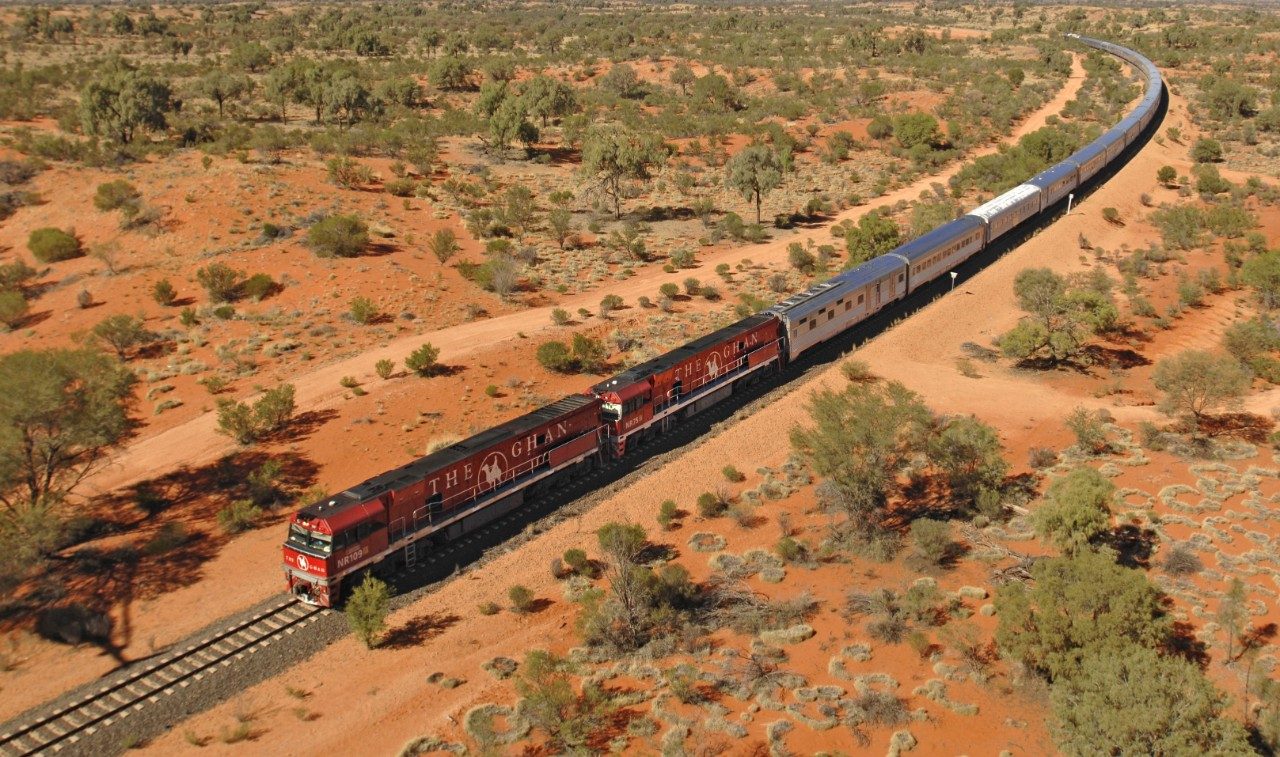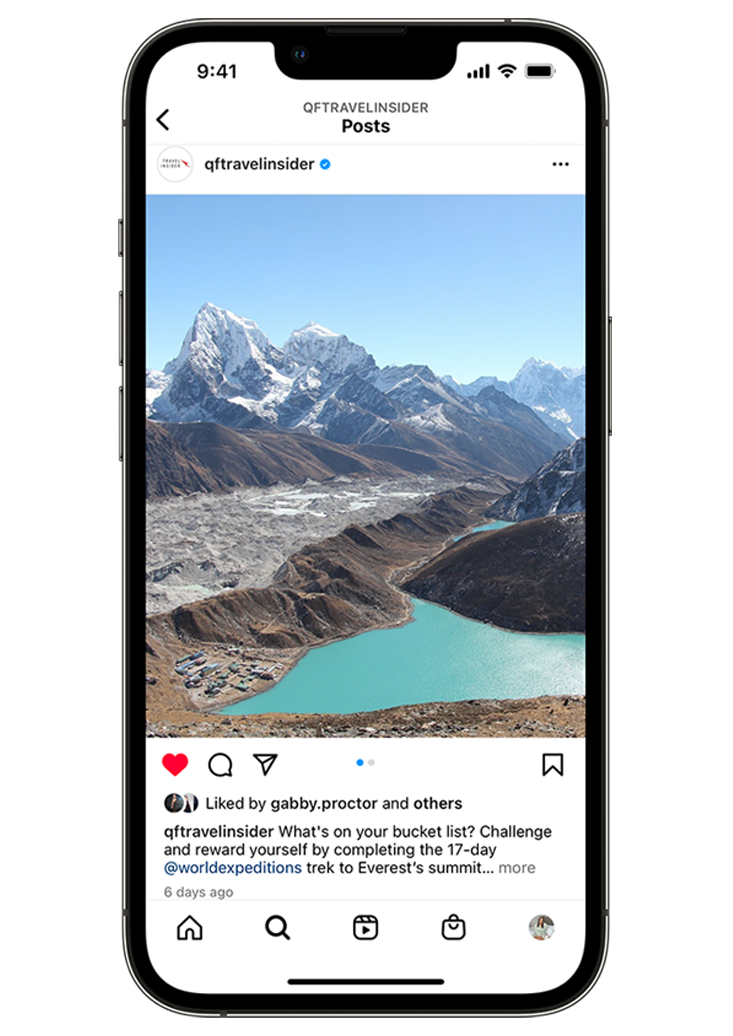Take Australia’s Most Romantic Rail Journey

It’s fast, it’s slow. It’s regimented but somehow relaxed. When the romance of a rail journey meets the spirit of Australia’s outback, magic happens. One of the world's great trains, the Ghan is an Australian icon.
It takes a second to figure out where I am. My room is rocking, gently and rhythmically, and blades of soft light are lifting the darkness. Clickety-clack hum, clickety-clack hum, clickety-clack hum. I slip out of bed, wind open the venetian blinds and because it’s 2023, reach for my phone. There’s a streak of cloud like a child’s finger-painting over Warumungu, about 500 kilometres north of Alice Springs (Mparntwe), and beneath it a blazing new day emerges, clear and endless like a portal into another galaxy. Of all the sights I’ll see from The Ghan over the next four days, sunrise packs the biggest emotional punch: watching this vast, ancient, living, breathing landscape waking up as it has done for millennia.

I’m on what for many of my 201 fellow passengers is the journey of a lifetime; an almost 3000-kilometre rail expedition from the Northern Territory capital of Darwin (Garramilla) down to Adelaide (Tarntanya) in South Australia, via Katherine, Alice Springs and Coober Pedy (Umoona). Along the way we’ll explore an age-old gorge, ride camels, be guided through chasms and desert parks and dine on white tablecloths with red dust at our feet and a sky full of stars overhead.
It’s a fun, meticulously organised speed date with outback Australia, variously beautiful, profound and surprising. “I’m a spiritual person,” says Melbourne retiree Barbara McArdle, who’s travelling with her husband, John. “[Being in the outback] gives you a wonderful feeling of how big the universe is and how small we are.”
Our ride is 735 metres long (it can stretch to a kilometre) with 31 carriages and no fewer than 40 cheerful staff members who will, variously, cook gourmet meals, pour fine wine, convert cabins into sleeping quarters and ensure passengers are always where they should be.

On that last point, they meet very little resistance. “Sometimes it’s nice to have a holiday where you don’t have to think about what to do next,” says Perth Auslan interpreter Alinta Cohen, who’s on the train with her lively 90-year-old mum, June. They are, like me, travelling in a Gold Twin cabin, which has a bench seat that turns into two narrow bunks at bedtime (Alinta confirms it’s she who climbs to the top bunk – after meeting June, you’d assume nothing) and a tiny ensuite. Platinum class cabins have double or twin beds, a bigger bathroom and an endless supply of Bollinger champagne.
Organising hundreds of passengers’ meal times, off-train activities and on-train etiquette (narrow corridors demand a Law of the Sea-like set of rules) requires a crack crew and our carriage has been blessed with Lily, one of four unflappable guest experience managers. By the time the train eases alongside a platform at Katherine station four hours after leaving Darwin, we know what we’re doing, when we’re dining, where to hang our clothes and who to call if the toilet goes bung. And we’ve had a taste of the glorious menu, with a brunch selection that includes buffalo curry, haloumi and roast vegetable salad and white chocolate and lychee pancakes.

But it’s in Katherine that one downside of the speed date becomes clear. The off-train experiences in each location look fabulous but you can only choose one. With two of today’s four activities temporarily off the table – a scenic helicopter flight and a tour of the Cutta Cutta Caves – our choices are a cruise through the phenomenal Nitmiluk Gorge or a visit to an outback cattle station to see working-dog and horse-breaking demonstrations and the tantalising prospect of a jackaroo playing guitar standing on the back of a horse.
For reasons that stretch beyond its natural majesty, Nitmiluk Gorge is never a wrong decision. It’s too early in the day, indeed the year, for the trill of cicadas after which the local Jawoyn people named the area. In its place is a steamy, other-worldly silence, a goose-bumpy reminder of our place in a landscape that goes back 1.6 billion years. As we motor along the Katherine River in an oversized tinny, skipper Jasmine guides our imaginations under the swirling water to the secret life of crocodiles, above it to the ancient sandstone cliff faces and back in time to a rich First Nations history, the arrival of European colonisers and the 1989 land rights victory that changed everything. I can’t wait to hear about the cattle dogs and singing cowboy from the guests who chose that option but this Jawoyn-run experience is outstanding.
Back on board the train, I shower (what looked like a laughably compact bathroom somehow works), change and make my way to dinner. The Outback Explorer Lounge is buzzing.
“Did you see the rock art?”
“Those dogs are so smart.”
“Espresso Martini, please.”
“The shower curtain doesn’t cling!”
Liane Schwandt, who has three rescue dogs at home in Berlin, had been to the working-dogs experience. “I loved it,” she tells me over a cocktail. “I got a lot of training tips.”
At 6.45pm, Lily calls us through to the Queen Adelaide Restaurant. The dining car is a nod to its regal namesake with crisp white tablecloths, booths for four and a lush Art Deco-style fit-out that speaks to the romance of rail travel but not the landscape we’re rolling through. There’s no mistaking the provenance of the menu, however, with sophisticated offerings such as crocodile dumplings and saltwater barramundi sitting alongside duck breast and Yorke Peninsula chickpea dahl.
Steve and Jenny Chensee, the retired owners of a successful printing business, are on a “ski” holiday – “Spending the Kids’ Inheritance,” says Jenny, laughing, as we dine alfresco the following night at the old Alice Springs Telegraph Station, a signature activity on The Ghan Expedition.
Flames dance from a row of rusty metal drums to our right but they’re no match for the desert winter chill. The Ghan was on Steve and Jenny’s COVID-interrupted bucket list. “This is an iconic thing to do,” they say, almost in unison. “The service and the staff are impeccable,” adds Steve, as a plate of pavlova lands on the table and a staffer tops up his wine.
While we’re tucked under our hypoallergenic quilts each night, the train carves a neat north-south line through the middle of Australia, taking a hard left as it snakes closer to Adelaide. By then, our senses, too, have negotiated a bend – the opal-mining outpost of Coober Pedy and its moonscape surroundings (if you’re in Coober Pedy and no-one has mentioned Mad Max, Mortal Kombat or any of the other intergalactic/apocalyptic features filmed here, wait a minute).

With vast fields of mine-shafts and mullock heaps and many of the town’s population living, working – even worshipping – underground to escape the extreme temperatures, it’s one of the trip’s most fascinating whistle stops.
As our bus returns to The Ghan, which is right where we left it at remote Manguri, the rail siding on Mount Clarence Station, we spot the flames of a bonfire. Drawing closer, happy huddles of humans come into focus, drinking wine and nibbling hors d’oeuvres in a setting so simply grand you wonder which element is key – the red dirt, the big sky, the fire, the setting sun bouncing off the train or the sight of sheer nothingness to the horizon. Maybe it’s all of them.
I grab a glass of wine and find Alinta and June. To celebrate June’s 90th birthday, the mother and daughter – who have travelled together by train throughout Europe and across Australia – are ticking The Ghan off June’s bucket list. (“I haven’t got a lot of time left,” she says with a wink.) “I think this is a particularly beautiful, gentle way for older folk to travel, see the country and meet people,” says Alinta. Her mum nods. “It’s not like going on a holiday to the beach where you just lie on the sand and go for a swim – that’s very boring,” says June, who’s braving the sunset chill in a peppermint-green pantsuit. “On this journey, every day has been different, every hour has been different.”
In fact, every moment has been different. Last night after dinner, chatting by the fire at the old Telegraph Station, I glanced up at the Milky Way just as a star fell, trailing a streak of white light in its wake. To the local Arrernte people, it means that the spirit of someone who died far away is returning home. In Western culture, it means I’m supposed to make a wish. I’m standing by a roaring fire under a blanket of stars in the middle of this epic country before falling asleep on a gently rocking train. My wish has already come true.

Start planning now
SEE ALSO: These are the Best Places to Stay in Darwin.
Image credits: Emily Weaving


